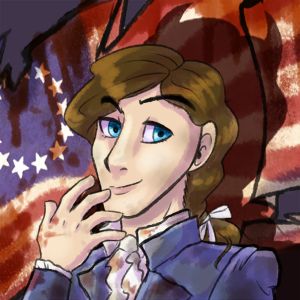Luke’s journal again
March 14, 1770
Father has gone mad! He came home today weaving like a drunkard, but with no smell from drinking on his breath. He stared into space and sometimes upward, with a strange smile on his face, muttering about angels from above and one particular “earthly angel” with which he said he was in love.
“Father, please make sense,” we begged him. “What’s happened?
“Who has bewitched you?” someone added.
To the last question, his eyes focused on us finally, and he broke into the most surprising laughter. “Bewitched? No witchcraft is this! Quite the opposite. Children!” he cried, opening his arms as if to embrace all present, and as if we were all still babes. “I thought I knew God before now—as much as an ordinary man might. But He has come and met me—by a grace I can’t begin to fathom, He has made Himself known—to one so unworthy!” His laughter turned to tears. I wondered if someone would send him to an insane asylum.
We all looked at one another in surprise and concern. Asher said, “What of the evangelists you went to argue with? Did you get them to stop the preaching and the carrying on?”
“No, no, if any of us were to stop them, I think the very stones would cry out!”
This was bad. Very bad. I thought, This must be the next calamity I sensed would fall upon our family.
He led a long, incomprehensible prayer over the evening meal, and, as we ate, he continued to talk, often stopping to stare into space again and barely touching his food. Why he would be impressed by an outdoor preacher whose message and style he despised and had come to counter, I couldn’t fathom. Until he spoke of the “earthly angel” in more detail. That was when I understood. A woman at the revival meeting had beguiled him with her beauty and blinded all the good sense he had. This woman he spoke of so glowingly that she seemed to outshine the words of the preacher, who was himself relatively unknown in comparison to others who had been through the area and preached to huge crowds in the open air.
One of my sisters asked, “What’s her name, Father?”
“I—haven’t been introduced to her yet. But I will, if the good Lord makes me worthy to stand in her shadow.”
I stifled a groan, hating romantic gibberish and horrified that Father had been hooked, and that by this fanatical rabble.
“I never imagined that God might speak through a mere human being, and that in my time—much less by the mouth of such a lovely and virtuous creature.”
How he can tell she’s virtuous by just seeing her one day and hearing her speak what he considers words of God, I can’t imagine.
“The woman prophesied,” he went on. “Her words were simple, but they broke my hard heart and had me in tears in a moment. I hadn’t known before today that my heart was hard and my soul close to Hell.”
I shifted in my chair, hoping no one could see my discomfort. Am I close to Hell? I know I wouldn’t go to Heaven if any event took my life today.
“No one can be certain of a home in heaven,” one of my brothers said.
“So the old churches say,” Father countered. “But some at the meeting have had visions of Heaven and seen their names in the Book of Life. Would that I could see the same!”
I know what it’s like to not fit in with the church’s beliefs and practices. Is Father going to be a heretic now? And this woman—I pictured some witch dressed like a prostitute luring him in like the bait on a fisherman’s hook—who is she? What will she be to us? Nothing, I hope.
I wait to see what will come of this change in Father. Time to hide my journal and go back home to sleep.
March 17, 1769
Father dragged all of his children to a revival meeting last night. I had always avoided them before, so I wasn’t prepared for the odd, disorderly behavior both during and after the sermon. It was so different from the services at our Anglican church, I felt as if I had stepped into a strange and savage country. I was baffled by the wordless groans, cries, tears, and even shouts of the listeners. I remembered my parents telling me to be quiet in God’s house. What a contrast! Father seemed too overcome to mind what earlier he had called “utterly irreverent and devilish nonsense.” Now, before my eyes, he wept and shook along with the rest of them.
A trembling woman walked by where we all stood and paused to look at us. Father paid her such rapt attention, I realized she must be the “earthly angel” he had spoken of. She was quite different from the temptress I had pictured. Her hair was wrapped in a scarf, and her clothes were modest and plain. But I could see what Father must see in her—a dark-eyed beauty with a perfect complexion. And when she spoke, her voice was even more melodious than Mother’s—if that’s possible. “You brought your children, sir?”
Father bowed to her as if she were some highborn noblewoman. “Yes.” His voice was strained after weeping, and also, I’m sure, because of his feelings for this woman. “I am a widower. Elijah Fleeland, at your service, ma’am.”
She curtsied only slightly, and said, “The Lord bless you all!”
As soon as she looked at me, something pushed me backward. I found myself falling. I would have hit the ground behind me, had not the crowd been so thick. Instead, I fell into the row of people standing behind me. A stranger caught me and set me back upright. What happened?
I looked around. The dark-eyed woman stood with her hands at her sides, smiling as if she were used to people falling down in front of her. Margaret, to my left, lay on the trampled grass, eyes closed, and when others tried to rouse her, she made no move.
Father looked at his eldest daughter, and at me. I was having trouble staying on my feet, and I didn’t like it. “May I?” the woman in front of us asked me. She reached out her hand. I shook my head, not wanting her to touch me. With sheer force of will, I recovered my balance.
“My name is Abigail Weston.” She addressed Father and then eyed the rest of us. She opened her mouth as if to say more, then stopped abruptly. With a nod, she left us and walked toward the front of the crowd. In a short while, she stood on a podium beside the preacher, lifted her voice to a surprising height, and cried out, “The Lord God is calling you to come to Him and receive His love! He wants your entire heart, not just a part of it! He wants everything you are, and everything you possess! Love the Lord your God with all your heart, soul, mind and strength! Follow the one whose blood was shed for you on the cross, and He will take care of all your needs!”
I maintained my balance now, with an effort. I couldn’t stop myself from shaking. I counted on the noise of the crowd to hide my repeated whisper: “NO.”
No. I won’t give in to this emotional appeal. I know my place in the world. I am an enemy of God, and I will fight Him in whatever way I can.
Margaret at last stirred and looked up with bleary eyes. Asher and the others helped her to her feet. She had few words to give, but said she had been taken to Heaven in a vision. For my part, I wanted to curse, but I restrained myself as usual.
Father didn’t herd us home until he had learned more about Abigail—that she was a widow living in New York City and often helped circuit-riding preachers with crusades. She belonged to a Methodist church in the same city—a church started by “New Lights” who had converted to faith in Christ alone during the preaching of George Whitefield and other dynamic ministers.
I got comfortable with behaving myself quietly in our Anglican church. I worked hard to build my reputation all these years. I don’t want this upheaval! I want nothing to do with Abigail and her strange ways. I’m ready to sail to England, far away from this religious insanity. I will be trained as a doctor, resting upon reason and science. I will stay far afield of this attention to souls. I will focus on bodies. When I come back—if I come back—I will be aloof from all this nonsense.
March 23, 1769
The unthinkable has happened. There will be no ship to England for me. No escape from Manhattan and this new religious insanity. Father has thrown most of his fortune—our inheritance!—away. He is indeed bewitched by that woman and her God—to the point that he threw our most valuable items onto a public bonfire. What a waste, to burn so much furniture and clothing! He would have burned the money and jewelry, if only the fire could have consumed them. Instead, he gave most of that to a minister to be sent to poor people who live far away, in places we have never been.
What am I to do about my future? I will be apprenticed to a local doctor. Father says that’s enough. I have no more trust in the doctor he chose than I do in the God Father gave it all up for. When I protested that the man was unlikely to teach me much of anything, Father said, “If you lack wisdom about healing, just ask the Lord. He’ll surely guide you.” He grasped my hands. “He may even grant supernatural healing through these hands. Remember the Luke in the Bible.” No reasoning can change his mind.
There is only a little left for Asher to maintain the import and export business after Father is gone—if the sanctions of our rulers oversea don’t bankrupt us.
Father spends much time in the revival meetings and has made some of us work in them for nothing. I am now an usher. Today, a man among the staff, named Nathan, looked me in the eye and said, “You are not what you seem.”
Did he see right through me? Has he found my journal in the woods? I stood frozen under his gaze.
Someone called him to some duty, and he walked away, much to my relief.
This night during the meeting, I was shaking again, a strange phenomenon I have no explanation for. I saw Nathan in the crowd, and he caught my eye again. I felt as if he might pour out all my secrets. I have heard him speak the secrets of others. I can’t afford anyone hearing about my vices. So tonight I joined the throng of those confessing their sins and offering their lives to God. It was all a show, as I have no intention of changing my ways.
Father was ecstatic to see me there. Margaret said she was happy over my “conversion,” but something else occupied her, I could see. Asher, at least, is reserved about the whole matter of evangelism.
Abigail glided up and said I had done well. Then she looked over at Father, and he looked back at her, as if to share a private moment I recognize so well. I have seen that look in the eyes of Margaret and her fiancé. I have shared something like that look with some of the women I have danced with when we flirted with fans and later found time alone together. People like to call it love. I call it infatuation, but it leads to the same thing.
My fears are coming about one-by-one. I can foresee that Abigail will become my stepmother.
Is there any rest from the mask I must wear?











Comments (0)
See all